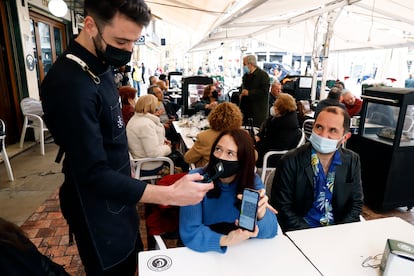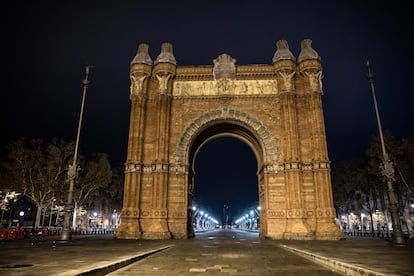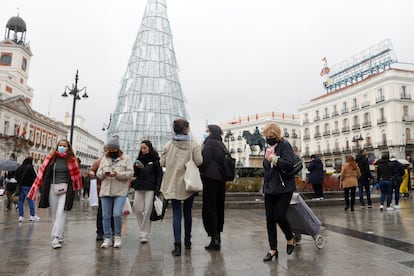Coronavirus restrictions: The latest measures in place ahead of New Year’s Eve, region by region
Some of Spain’s regional governments are not putting in new limits for the coming weeks, while others are imposing curfews and requiring so-called ‘Covid passports’

The omicron variant of the coronavirus continues to affect this year’s Christmas holidays in Spain. A number of regions have already announced restrictions for the hospitality sector and New Year’s celebrations. Here is the latest information, broken down by territory.
Andalusia
Until January 15, the so-called “Covid passport” will be obligatory for entry to hospitality and nightlife venues, as well as access to hospitals and care homes. Anyone who does not have one will have to show a negative coronavirus test. Indoors, there is a recommendation of no more than 10 people per table, and that no more than two bubble groups take part in social meetings. Another recommendation is that people see in the New Year in wide open streets. Kings’ Day processions are not recommended, but if they do go ahead they should also be on wide streets.
Aragón
Until January 15, the Covid passport will be necessary for celebrations of more than 10 people and for access to nightlife, betting shops, hospitals and other social centers. They will also be needed for events with more than 500 attendees if indoors, or 1,000 if outdoors.
Hospitality venues must close at midnight, and nightlife venues at 2am. Tables are limited to 10 people inside and outside, and smoking is banned on sidewalk cafés as is drinking at the bar. The regional government is recommending no more than 10 people at social events from no more than two bubble groups. No specific measures have been approved for Kings’ Day or New Year’s Eve.
Asturias
The Covid passport is required for access to hospitality, care homes and gyms. Indoor nightlife venues are closed, and bars and restaurants must shut at 1am. The regional government recommends 10 people from two bubbles for social events. Local councils will have the final say on Kings’ Day parades – some have already opted to cancel them.
Balearic Islands
The Balearic government is requiring Covid passports for healthcare workers, as well as for hospitality, nightlife, gyms, care homes and cultural spaces. A special monitoring plan has been announced for nightlife venues during New Year, and if the rules are not observed – such as mask requirements – more drastic measures have been threatened, including the closure of the sector.
Basque Country
All hospitality and nightlife venues must close at 1am, meaning that many New Year’s celebrations have been canceled or altered. Capacity indoors is limited to 60%, and people must eat and drink seated. Tables are limited to 10 people outside and inside. From January 1 to 6, hospitality venues cannot open before 8am. Capacity for any cultural or sporting event is limited to 600 inside and 800 outside. Sports activities must be limited to groups of 10 and locker rooms are limited to 50% capacity. These measures will go into force today until January 28.
Canary Islands
The Covid passport is required on the islands with higher incidence rates (currently Gran Canaria, Tenerife and Fuerteventura) for access to bars, restaurants and nightlife venues, as well as gyms and healthcare facilities. The hospitality sector must close earlier according to its epidemiological situation (between 1 and 3am in Gran Canaria, Tenerife and Fuerteventura). Capacity of venues is between 33 and 75% according to the incidence of each island. Private social meetings in closed spaces are limited to 10 people unless they live together.
Cantabria
A total of 50 of 102 municipalities in Cantabria are above level 3 of the coronavirus alert level, meaning that nightlife in those areas has been closed since Tuesday. The Covid passport is required for entry into bars, restaurants and nightclubs. Tables are limited to six people, and capacity is at 75% for hospitality venues. There are no limits on social or family meetings. Kings’ Day parades will be static, like last year.
Castilla-La Mancha
The region will not enforce additional restrictions for Christmas or New Year. The regional premier, Emiliano García Page, announced last Wednesday that he would be meeting with the Public Health Commission to evaluate the latest figures after Christmas.
Castilla y León
This region also has not put obligatory measures in place for the holiday season, but it has recommended limiting the number of participants at social meetings, without specifying how many.
Catalonia
Catalonia has implemented a curfew from 1 to 6am for municipalities of more than 10,000 residents and that have a cumulative 14-day incidence above 250 cases per 100,000 inhabitants. Nightlife is closed. Bars and restaurants are limited to 50% capacity, while sports, commercial, cultural and religious events are at 70%. Social meetings in a private setting must be limited to 10 people. Christmas celebrations have been canceled in Barcelona, and the Covid passport must be shown for access to care homes, bars, restaurants and gyms.
Extremadura
There are no extra restrictions, but the recommendation is for people to hold social meetings outside and that tables be limited to 10 diners.

Galicia
Between December 31 and January 18, hospitality and nightlife venues must close early, and if the courts approve it, there will be a ban on people meeting in the streets between 3 and 6am. Bars and restaurants must close at midnight (drinking at the bar is not permitted), apart from Fridays and Saturdays, when it is 1am. Nightclubs must close at 3am. People must be seated at large music events and cannot eat or drink.
On the night of New Year’s Eve, hospitality venues must be closed between 1am and 10am, and nightlife venues must close at 3am. Pubs and nightclubs that agree to close between December 30 and January 2 will be given financial compensation by the regional authorities. Covid passports are required for hospitality, healthcare facilities, care homes, gyms, museums and other cultural venues. Tables are limited to eight diners inside and 10 outside.
Madrid
The regional premier, Isabel Díaz Ayuso, has not implemented new restrictions and has instead been encouraging individual responsibility to stem the wave of infections. Five large New Year’s events – with between 500 and 1,000 people expected – have been denied permission to operate. Madrid City Hall is limiting access to the central Puerta del Sol square to 7,000 people on New Year’s Eve to see in 2022.
Murcia
Any non-essential activity must close at 1am in Murcia, a measure that will be in place until January 14. Bars and restaurants must limit groups to 10 people inside and 12 outside. Dance floors must be closed and people can only drink while seated. All major events for the holiday season must limit capacity to 50%, and the public must always be seated, even when outdoors.

Navarre
The region has closed hospitality and nightlife venues at 1am, banned drinking at the bar and limited tables to 10 diners. Covid passports are required for gyms, hotels and senior homes. All of these measures will be in place until January 14.
La Rioja
The closure of hospitality and nightlife venues has been brought forward to 1am. Distance between tables and patrons at the bar must be a minimum of 1.5 meters. Covid passports are required for hospitals, residences, nightclubs, restaurants bars and concerts, as well as other activities with crowds in enclosed spaces.
Valencia
New Year’s celebrations have not been canceled so far, but the hospitality sector is reporting a lot of cancelations due to the pandemic. Covid passports must be used for access to venues. The Valencia city council has canceled the ringing in of the New Year in its main square, but other New Year’s parties are still going ahead.
Tu suscripción se está usando en otro dispositivo
¿Quieres añadir otro usuario a tu suscripción?
Si continúas leyendo en este dispositivo, no se podrá leer en el otro.
FlechaTu suscripción se está usando en otro dispositivo y solo puedes acceder a EL PAÍS desde un dispositivo a la vez.
Si quieres compartir tu cuenta, cambia tu suscripción a la modalidad Premium, así podrás añadir otro usuario. Cada uno accederá con su propia cuenta de email, lo que os permitirá personalizar vuestra experiencia en EL PAÍS.
¿Tienes una suscripción de empresa? Accede aquí para contratar más cuentas.
En el caso de no saber quién está usando tu cuenta, te recomendamos cambiar tu contraseña aquí.
Si decides continuar compartiendo tu cuenta, este mensaje se mostrará en tu dispositivo y en el de la otra persona que está usando tu cuenta de forma indefinida, afectando a tu experiencia de lectura. Puedes consultar aquí los términos y condiciones de la suscripción digital.








































